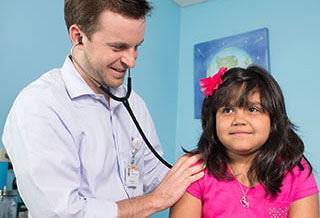Whether your child will be attending school remotely or in-person, the school day will be very different for everyone. Our pediatric health experts are here to help you and your family through the transition back to school and throughout the school year. At Brenner Children's we're here to support you and your child’s physical or mental well being.
Back to School
Stay connected with the latest tips about getting back to school from the experts at Brenner Children's.
Importance of Immunizations
“Many children and teens have not been visiting their pediatricians as often as they should due to the pandemic, but it’s important to know that health care providers have taken extra steps to make sure all of our patients are protected from COVID-19 when they come in to visit,” said Kimberly Montez, M.D., a pediatrician with Brenner Children’s.
In addition, it will be critical for children to receive the flu shot, once it is available, to reduce the spread of influenza this fall and winter.
Immunization Quick Facts
- Kindergarten and 7th grade students are required to submit their vaccination records.
- Make sure your child has the required immunizations.
- The Meningococcal Vaccine is now required of all students entering 12th grade Fall of 2020 school year. This is the second dose of the meningococcal vaccine which was received as a requirement for entering 7th grade. If your child had their first dose at age 16 or after, they will not be required to get the second dose.
Please contact your pediatrician if you have questions or schedule an appointment for vaccinations.
Need Help Picking a Pediatrician?

You’ll need to schedule your baby’s first doctor’s visit a few days after they’re born. If you’re still trying to pick a pediatrician, we can help.
Atrium Health Wake Forest Baptist is home to board-certified pediatricians, family medicine providers and nurse practitioners, all expertly trained in the unique health needs of children.
We’re here to help your baby stay healthy now and as they grow up, with well-child visits, same-day sick visits and care for chronic conditions, plus direct connection to Brenner Children’s Hospital if more specialized care is needed.
Stress and Anxiety Management During COVID-19

While it’s understandable that many children will be anxious about this school year, parents can help alleviate some of the concern by preparing their kids for what’s to come and allowing them to talk about their feelings.
“We encourage parents to be open and honest with their children and to be watching for changes in behavior or mood that could signal that a child is having difficulty adjusting,” said Linda Nicolotti, PhD, a pediatric psychologist with Brenner Children’s. “Many children are anxious right now and they will miss all the social aspects of school, so we’re encouraging them to spend extra time with their family and to take advantage of staying connected with their friends virtually.”
Parents should remind children and teens that there are important steps they can take to help control the situation, such as washing their hands, social distancing and maintaining a healthy diet.
Multisystem Inflammatory Syndrome in Children (MIS-C)
 Multisystem Inflammatory Syndrome in Children (MIS-C) is a very rare and relatively new disease that is not yet completely understood, but at this time, health experts believe it is a complication of a delayed inflammatory response to a COVID-19 infection.
Multisystem Inflammatory Syndrome in Children (MIS-C) is a very rare and relatively new disease that is not yet completely understood, but at this time, health experts believe it is a complication of a delayed inflammatory response to a COVID-19 infection.
Right now, the average age of patients appears to be around 8 years of age and the disease seems to be more common in Black or Hispanic children, with a survival rate of around 98%.
“This is a new disease but we are constantly learning more about how various organs can be affected, including the heart,” said Kacy Ramirez, M.D., a pediatric infectious disease expert with Brenner Children’s. “Initial symptoms often include a high fever, vomiting, diarrhea, rash, confusion, sleepiness or a headache, so if a child experiences these symptoms, we urge parents to contact their pediatrician right away. For more serious issues such as difficulty breathing or seizures, children should be brought immediately to the nearest emergency department.”
Experts recommend the best way to avoid contracting MIS-C is to reduce the risk of exposure to COVID-19. Steps parents and children can take include limiting nonessential activities, gatherings and events, social distancing, washing hands and avoiding touching the face.
